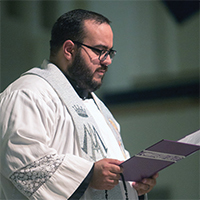In the Name of the Lord
Opening Prayer
Lord, you designed all perfectly. You designed our love to reflect yours, yet we fail to love as you do. Please bless us with the grace to live lives of holiness, especially within our families. Teach me how to be the best person you have called me to be within my family and to never take for granted the love and support I have from those closest to me. Today, please bless those who struggle to find peace within their homes. Amen.
First Reading: Sirach 3:2–7, 12–14
Responsorial Psalm:
Psalm 128:1–2, 3, 4–5
Second Reading: Colossians 3:12–21
Gospel: Luke 2:22–40
Challenge for the Week
Take some time to pray for one member of your family whom you have had a hard time forgiving or seeking forgiveness from. Write a letter of love and gratitude and, if you feel called, find a way to give that letter to your family member this week.
Journal
1. Go back and reread the second reading from today. Did you read it differently now than before? If so, what changed?
2. What does your relationship look like with your immediate family? Extended family?
3. What might need to change in order to get along better? Or what is going well that is necessary to protect for the sake of a healthy family?
Beyond Words
Why did God ordain that Mary marry Joseph? It wasn’t for protection. God could have assigned Mary and Jesus as many guardian angels as he desired. It wasn’t to put food on the table. God fed the Israelites manna and quail. We see that in God’s intentional and perfect design, a family is made up of a mother and a father. While single-parent homes demonstrate a heroic virtue on the part of one parent doing the job of two, the best scenario is one in which both sexes work in self-sacrificial complementarity to one another. Both mother and father offer an indispensable witness to a child, as we hear in the first reading from Sirach. God the Father designs unique roles for both mother and father and empowers them with his authority and with a mission: to raise up children who will know and love him.
Raising a holy family requires that the souls doing the raising know the Lord and seek him daily, which St. Paul stresses to the Colossians in the second reading. Practically speaking, a virtuous life looks like a home in which the parents (and kids) know they are loved by God and offer compassion, forgiveness, gentleness, and patience. It will be a home ruled by peace-filled hearts in which the Word of God dwells. A holy family will fill the air with wisdom, gratitude, and joyful music all “in the name of the Lord.”
Even in times of sorrow and (impending) suffering, as found in the gospel, a holy family keeps their eyes fixed on God. Unwavering in love, faithful through trials, and confident in God’s mercy, a holy family is one that “fears the Lord and walks in his ways.”.
Related Fact
The book of Sirach appears in Catholic Bibles but was removed from the Protestant canon of scripture during the Protestant Reformation. As a result, Sirach (along with 1 and 2 Maccabees, Judith, Tobit, Baruch, Wisdom, and additions to the books of Esther and Daniel) is not found in Protestant Bibles unless included in an “extra” section called the Apocrypha. When you are holding a Catholic Bible, you are holding the director’s cut, not a version reformatted to fit your screen or edited for television.
Behind the Scenes
The gospel notes “the days . . . completed for their purification” as a period of waiting between Jesus’s birth and his Presentation in the Temple. In Jewish culture, an Israelite woman was not allowed to approach the Temple for forty days after childbirth to ensure that she was fully healed and free of any blood or other condition following labor. This was not a punishment for any sin, failure, or immoral act. The purification time was prescribed during the time of Moses to ensure there was no physical impurity (i.e., blood) brought into the Temple area or brought into contact with sacred objects.
Word Play
The word subordinate in the second reading from St. Paul is problematic to many modern listeners. Part of the problem is the translation. The actual Greek uses not “be subordinate” (which carries a very negative connotation) but rather “be subject” or “be submissive.”
While at first view this seems to imply that wives are degraded, it was exactly the opposite in St. Paul’s viewpoint. The ancient world often viewed wives as literal property of a husband, and most cultures leaned into that condescending viewpoint. St. Paul is offering a new vision in Christ, one in which both husband and wife live lives of mutual sacrifice, respect, and self-gift rooted in dignity. The wife humbly allows the husband to lead the family as part of his unique mission. His mission, in turn, is to sacrifice all—to die—for the family. So, to “be submissive” means that the wife places herself (sub-missio) “under the mission of ” the husband; she allows the husband to protect and serve her and, ultimately, to die for her in big and little ways. The couple’s mutual self-sacrifice serves as an example of self-giving love, which mirrors the Trinity.
This excerpt from One Sunday at a Time: Preparing Your Heart for Weekly Mass (Cycle B) is reprinted with permission of Ave Maria Press.










 Kimberly Kay Cox
Kimberly Kay Cox







 Mark Mogilka
Mark Mogilka





























 Armando Cervantes
Armando Cervantes Anna Betancourt
Anna Betancourt
 Andrea Chavez-Kopp
Andrea Chavez-Kopp